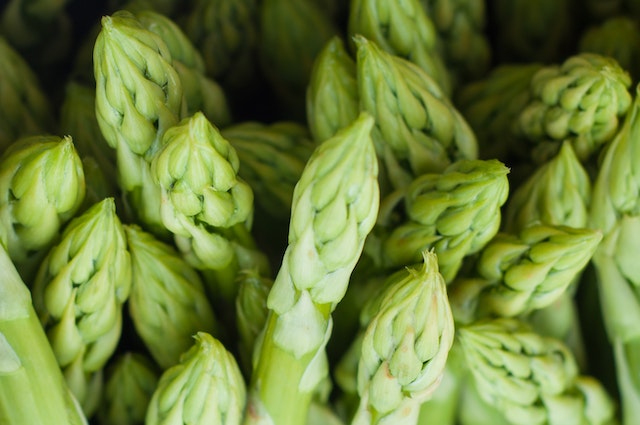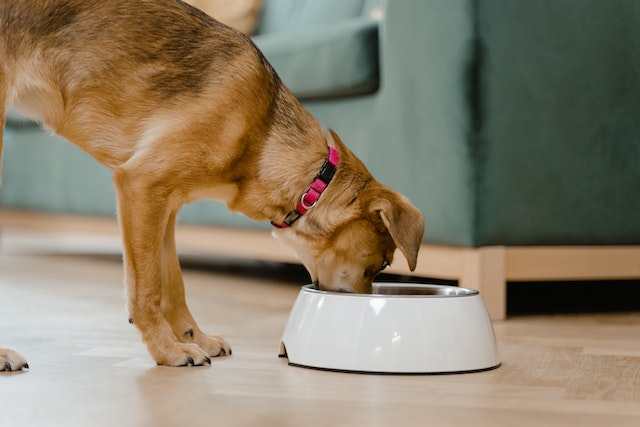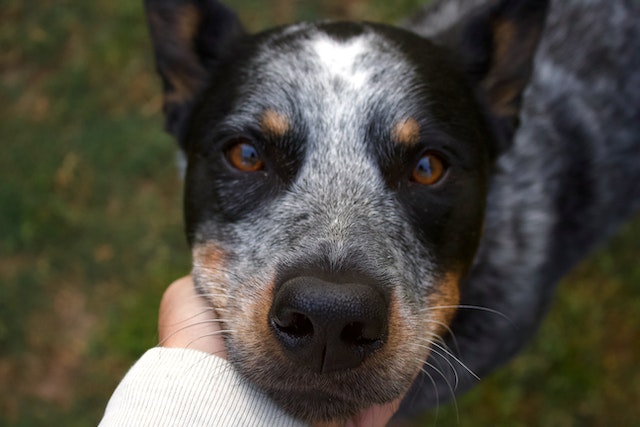In short, dogs can eat asparagus – but there are a few things to keep in mind. Asparagus is safe for canines to eat as long as it is cooked until it is soft and all of the tough ends have been trimmed off.
Raw asparagus is harder for them to digest, and whole stalks can pose a choking hazard. Asparagus is high in folic acid, potassium, fiber, thiamin, vitamin A, and vitamin B6 – all important nutrients for pups.
“My Australian Shepherd loves eating asparagus! It’s crazy to see how healthy and shiny it’s made her coat. I highly recommend adding it to your Aussie’s diet” – Nichole, Aussie lover and owner
And if you happen to be looking for a different vegetable to feed your pup, I wrote an article about veggies that are safe for Australian Shepherds (and other breeds).
What Are the Benefits of Asparagus for Dogs?
Your furry friends can benefit from eating asparagus. The veggie is low in calories, fats and sugar, but contains several important vitamins and minerals. It also is packed with dietary fiber and antioxidants that can help fight cell damage.
What Nutrients Does Asparagus Offer Canines?
Asparagus provides Fido with B-Complex vitamins, Vitamins A, C, and K, and micronutrients such as potassium, zinc, and iron. The vegetable is also a great source of dietary fiber and antioxidants.
I feed both of my Aussie’s asparagus when it’s in season, but I’ve learned there’s a ton of benefits to feeding them a multivitamin (just like I take everyday only for 4 legged mongrels!). I’ve tried a few, but this one on Amazon has been their favorite and it’s also the one that checks off all the boxes I needed for them to stay healthy. I encourage all of my 4 legged-owner friends to get this one.

How Much Asparagus Can A Dog Eat?
Small amounts of asparagus are fine for Fido to eat. Some canines may experience gastrointestinal distress after eating asparagus; so, it is recommended to introduce this vegetable to your buddy’s diet slowly and in modest amounts.
It’s also important to realise that raw asparagus can be tough for a dog to digest. It’s best to boil it before feeding it to your pet. Asparagus shouldn’t account for more than 10 percent of your dog’s daily calorie intake at most. If you have any questions or concerns regarding the food your bark-machine is eating, it is best to talk to your vet.
How Can I Serve Asparagus to My Dog?
Asparagus can be served to your pet in a variety of ways. For example, make a smoothie of healthy fruits and veggies with plain Greek yogurt and asparagus. You can also add chopped asparagus to your puppy’s food bowl or hand-feed them bites as a treat. Just don’t feed your dog raw asparagus.
Other Serving Ideas
If you choose to share some asparagus with your pup, it’s important to ensure that it is cooked until soft and cut into small pieces. My pooches like it added as a topping to their food.
Broccoli and Canines
Sometimes I’ll throw in a little left over potato or even broccoli for good measure. Not gonna lie though, Rango WILL NOT eat that broccoli. He spits it right out on the floor. Health be damned.
Asparagus Soup
You can chop the asparagus and cook it in bone broth with things like green beans, peas, carrots and sweet potatoes to ladle up some delicious soup for your pet.
Do understand, if you make asparagus soup for your furry pal, don’t make the kind that us “human-types” eat. Usually ours has a bunch of stuff in it that isn’t good for pooches like heavy cream and butter…then again, that’s not really very good for US either.
Carrots and celery – even cucumbers – are ok to blend up. They’ll lap it up, guaranteed. Little do they know they’ll be getting all kinds of fiber, minerals, vitamins and antioxidants.
Doggy Risotto
You can also cook rice in chicken broth and add chopped asparagus, carrots, celery, cucumbers and potato in the last 10 minutes for a tasty “doggy risotto”. You can even share a steamed spear of plain cooked asparagus as a simple, healthy treat.
How Much Asparagus Can My Dog Eat?
It is typically recommended to follow the 10% rule when giving them treats, as this includes raw vegetables.
Asparagus is made up of 93% water and contains 28 calories per cup. Since asparagus is high in fiber, too much could lead to gas and diarrhea. When introducing asparagus to your pet, start with a small amount and gradually increase if there are no negative reactions.

Are There Any Risks Involved When Feeding Asparagus to Dogs?
Asparagus is not toxic for dogs.
However, it is important to make sure the asparagus is cooked until soft, and all tough ends have been chopped off. Wild asparagus plants can produce small red berries, which are poisonous to humans and dogs, so make sure to only consume asparagus when it is in the tender shoot stage. Ingestion of the berries can cause vomiting, diarrhea, and stomach pain.
Therefore, if you’re growing asparagus in your home garden, it’s best to keep Charlie (or whatever your fur-pals name is) away from the plants with a sturdy fence.
Too much dietary fiber
Can cause gassiness, stomach upset and vomiting
Not all parts of the asparagus plant are safe for dogs, so it is important to only feed them the tender asparagus spears. Canned asparagus often has too much salt for dogs so opt for cooked, unseasoned fresh asparagus instead.
Can My Dog Eat Asparagus Off My Plate?
It is not recommended to feed your dog asparagus off your plate if you season it with spices or sauces. Seasonings can be poisonous for dogs so prepare a few plain asparagus spears for your pup instead.

Can Diabetic or Overweight Dogs Eat Asparagus?
Diabetic and overweight dogs can definitely benefit from eating asparagus. The veggie is low in calories and fats and contains no sugars. It has a high water content, which can be an excellent option for portly dogs on a weight management plan. However, it is important to always check with your veterinarian before feeding your pup asparagus.
Fruits and vegetables should only be an occasional treat, and your dog’s diet should primarily consist of commercial dog food.

Some Other Vegetables That My Pups Like (and yours prolly will too)
-
Frozen peas
- Seaweed: While debatable that this is a vegetable, it has some shockingly good health benefits. Find out if seaweed is right for your dog in my article Can Dog’s Eat Seaweed?
-
Broccoli (my dogs are 1 for 2 on this…one hates it, one loves it — cooked soft)
-
Green Beans (these have been a big hit with literally every dog I’ve ever had)
-
Sweet Potatoes (Boil em up, put em in a stew)
-
Russet potatoes – There’s some risks, so make sure they are cooked thoroughly.
What Vegetables Can Dogs Not Eat (and other things that aren’t a treat):
-
Onions, garlic, leeks and scallions: can cause anemia in dogs as they contain a compound known as thiosulphate.
-
Avocado: contains a substance called persin which is toxic to dogs.
-
Rhubarb: contains oxalic acid which can be toxic if ingested in large quantities.
-
Mushrooms: some types of mushrooms are highly toxic to animals and can cause severe health problems.
-
Tomatoes: contain solanine, a toxin that can cause digestive upset and other health issues in your pooch.
-
Potatoes: raw potatoes contain solanine, just like tomatoes, and should not be consumed by dogs.
-
Grapes and raisins: can cause kidney failure when consumed by dogs.
-
Nuts (especially macadamia nuts): contain high levels of fat which can lead to pancreatitis or even death.
-
Milk Chocolate or Dark Chocolate: Chocolate contains theobromine, which is toxic to dogs. In severe cases, consumption of chocolate can lead to seizures, coma and even death.
-
Coffee, tea, and other caffeine sources: caffeine is highly toxic for dogs and can lead to agitation, heaving, heart palpitations and even death.
-
Xylitol (found in some chewing gums, toothpastes, and baked goods): consumption of xylitol by dogs can cause liver failure or even death.
-
Salt: excessive consumption of salt can lead to your dog having and imbalance in dehydration or electrolytes.
- Sugar
Final Thoughts
In conclusion, asparagus is a healthful and tasty addition to your dog’s diet. It can provide many positive benefits including improved digestion, better immune health, and shiny fur.
As with any dietary change, it’s important to speak to your vet first before making any decisions about what food you should give your pup. With the right preparation, asparagus could be the perfect addition to your furry friend’s meals!
———
Dogs can eat asparagus in moderation. According to the American Kennel Club, this vegetable is safe for dogs and can even provide some health benefits. Asparagus contains antioxidants, vitamin K, and folate, all of which can help support a healthy immune system. Additionally, asparagus is low in calories and a good source of dietary fiber, making it a great snack for dogs that need to lose weight.
However, owners should be mindful when giving their dog asparagus. As with all human foods, asparagus should not be given to dogs in large amounts. Too much asparagus can cause digestive upset and ultimately lead to an unhealthy diet. When feeding your dog asparagus, it is important to remove the tough ends, as they can be a choking hazard. Additionally, asparagus should never be given to puppies or dogs with existing health issues.


